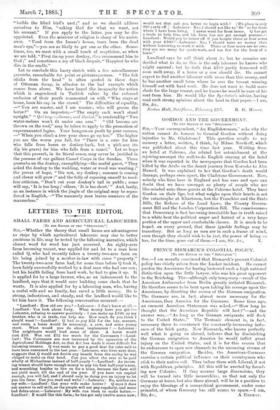PRINCE BISMARCK'S COLONIAL POLICY.
[To THE EDITOR OF THE " SPECTATOR ".1 SIR,—I am morally convinced that Bismarck's present Colonial policy has chiefly arisen from the Lasker incident. He cannot pardon the Americans for having bestowed such a high national distinction upon the little lawyer, who was his great opponent in the Reichstag. The—although only temporary—recall of the American Ambassador from Berlin greatly irritated Bismarck. He therefore seems to be bent upon taking his revenge upon the Americans, by diverting the course of the German emigration. The Germans are, in fact, almost more necessary for the Americans, than America for the Germans. Some time ago, an eminent American Statesman was asked,—" How long he thought that the American Republic will list ?"—and the answer was,—" As long as the German emigrants will flock to the United States." The Teutonic element is, in fact, necessary there to counteract the constantly-increasing influence of the Irish party. Now Bismarck, who knows perfectly well what is going on abroad, believes that by diminishing the German emigration to America he would inflict great injury on the United States, and it is for this reason that he endeavours to open new channels to the unceasing stream of the German emigration. Besides, the American-Germans exercise a certain political influence on their countrymen who stick to their native soil. They imbue them with Liberal, if not with Republican, principles. All this will be averted by founding new Colonies. If they assume large dimensions, they will be turned into little monarchies; so that not only the Germans at home, but also those abroad, will be in a position to enjoy the blessings of a monarchical government, under some princelet, of whom Germany has still scores to spare.—I am, Sir, &c., A GERMAN.














































 Previous page
Previous page